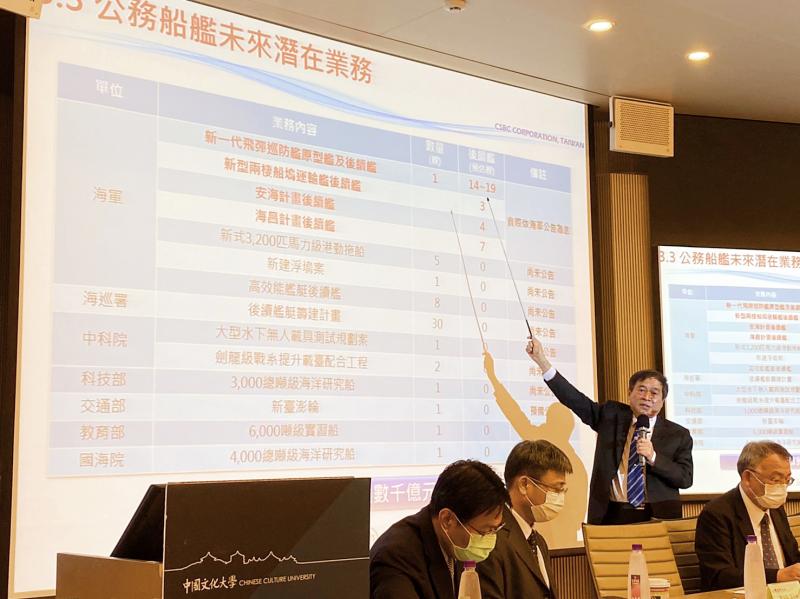CSBC Corp, Taiwan (台灣國際造船) yesterday reported net losses of NT$965 million (US$33.46 million) in the first three quarters, 21 percent larger than net losses of NT$795 million last year, due to delays in the delivery of raw materials during the COVID-19 pandemic and the appreciation of the New Taiwan dollar against the US dollar.
While cumulative revenue increased 69.1 percent year-on-year to NT$19.64 billion for the first nine months of this year, CSBC’s costs expanded 69.7 percent to NT$20.37 billion, resulting in a gross loss of NT$733 million, up 87 percent from a gross loss of NT$391 million last year, the shipbuilder told an investors’ conference in Taipei.
“It was not a rosy performance,” CSBC president Tseng Kuo-cheng (曾國正) said. “Our construction work was seriously affected by delays in raw material deliveries during the pandemic and many of our foreign engineers could not come to Taiwan as scheduled.”

Photo: Kao Shih-ching, Taipei Times
Earlier this year, the firm had needed to import some materials from Wuhan, China, but transportation at the epicenter of the pandemic was completely halted due to lockdown measures, Tseng said.
“A delay in building one vessel had a domino effect on the construction of other vessels, as we have limited docking capacity,” he said.
The company calculates its revenue based on construction progress, so delays slowed revenue growth and increased operating costs, Tseng added.
The company was also hurt by a strong NT dollar, as most commercial shipbuilding contracts are denominated in US dollars and commercial shipbuilding makes up 30 percent of CSBC’s total sales, Tseng said.
CSBC had forecast that the exchange rate to the US dollar would stay at about NT$30.5, but the NT dollar’s unexpected appreciation to NT$28.5 is expected to cost the company NT$400 million in revenue, he said.
“Most of our orders have fixed prices,” CSBC executive vice president Mike Chou (周志明) said. “We tried to include in contracts that the price would be adjusted based on fluctuations in the exchange rate, but few buyers were willing to accept that, as no one likes to take on foreign-exchange risks.”
To avoid delays in raw materials, CSBC has diversified imports of raw materials, as it does not seem like the pandemic will slow down anytime soon, Tseng said.
For next year, the company plans to further reduce the number of commercial shipbuilding contracts — which have a low margin — to 22 percent of total revenue, CSBC chairman Cheng Wen-lon (鄭文隆) said, adding that the reduction would allow the company to focus on high-margin orders, such as 2,800 twenty-foot equivalent unit container vessels.
“To regain momentum, the company will focus more on government projects, such as military vessels, and offshore marine construction,” Cheng said.
The company has gained government approval to issue 450 million new shares, an injection of NT$7 billion, boosting its paid-in capital to NT$10 billion, he said.

With an approval rating of just two percent, Peruvian President Dina Boluarte might be the world’s most unpopular leader, according to pollsters. Protests greeted her rise to power 29 months ago, and have marked her entire term — joined by assorted scandals, investigations, controversies and a surge in gang violence. The 63-year-old is the target of a dozen probes, including for her alleged failure to declare gifts of luxury jewels and watches, a scandal inevitably dubbed “Rolexgate.” She is also under the microscope for a two-week undeclared absence for nose surgery — which she insists was medical, not cosmetic — and is

GROWING CONCERN: Some senior Trump administration officials opposed the UAE expansion over fears that another TSMC project could jeopardize its US investment Taiwan Semiconductor Manufacturing Co (TSMC, 台積電) is evaluating building an advanced production facility in the United Arab Emirates (UAE) and has discussed the possibility with officials in US President Donald Trump’s administration, people familiar with the matter said, in a potentially major bet on the Middle East that would only come to fruition with Washington’s approval. The company has had multiple meetings in the past few months with US Special Envoy to the Middle East Steve Witkoff and officials from MGX, an influential investment vehicle overseen by the UAE president’s brother, the people said. The conversations are a continuation of talks that

CAUTIOUS RECOVERY: While the manufacturing sector returned to growth amid the US-China trade truce, firms remain wary as uncertainty clouds the outlook, the CIER said The local manufacturing sector returned to expansion last month, as the official purchasing managers’ index (PMI) rose 2.1 points to 51.0, driven by a temporary easing in US-China trade tensions, the Chung-Hua Institution for Economic Research (CIER, 中華經濟研究院) said yesterday. The PMI gauges the health of the manufacturing industry, with readings above 50 indicating expansion and those below 50 signaling contraction. “Firms are not as pessimistic as they were in April, but they remain far from optimistic,” CIER president Lien Hsien-ming (連賢明) said at a news conference. The full impact of US tariff decisions is unlikely to become clear until later this month

Nintendo Co hopes to match the runaway success of the Switch when its leveled-up new console hits shelves on Thursday, with strong early sales expected despite the gadget’s high price. Featuring a bigger screen and more processing power, the Switch 2 is an upgrade to its predecessor, which has sold 152 million units since launching in 2017 — making it the third-best-selling video game console of all time. However, despite buzz among fans and robust demand for pre-orders, headwinds for Nintendo include uncertainty over US trade tariffs and whether enough people are willing to shell out. The Switch 2 “is priced relatively high”